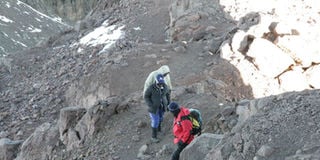The vanishing snow of Mount Kenya

Mt Kenya's snow area. Mountain glaciers are melting at an alarming rate and if this continues, the fun of climbing this mountain may vanish forever. FILE
The ultimate joy of a mountain climber is reaching the snow-covered peak.
But those who have been scaling Mt Kenya, Africa’s second highest mountain, have a reason to worry.
Mountain glaciers are melting at an alarming rate and if this continues, the fun of climbing this mountain may vanish forever.
About a century ago, there were over 18 glaciers (masses of moving snow at the peak of the mountain) on the mountain which stands at 1,599 metres above sea level.
But today there are only 11 and four of them are a pale shadow of what they were 30 years ago, thanks to the effect of global warming and climate change.
Mr Hiram Munuhe a veteran mountain guide says he has watched the glaciers disappear before his very eyes over the last 20 years.
At first he could not understand what the cause was but not any more. He knows exactly what the problem is.
“Today, I fully understand the effects of climate change on Mt Kenya’s biodiversity. Unfortunately, this is affecting my job and those of 600 others who derive their livelihood from guiding tourists to climb the highest peak on the mountain,” he explains.
Every year, about 40,000 people climb the mountain according to records from the Kenya Wildlife Service.
To a mountain climber, there is no joy when one has not reached the highest point, Batian, which has to be accessed by climbing through masses of ice.
Bare rocks
But many are the times Mr Munuhe’s visitors are disappointed when they find the climbing less challenging since they have to walk on bare rocks.
“Most climbers use Austrian hut as the base for the climbing especially when they are on the South East face of Nelion and Batian.
They have to walk near the Lewis Glacier which is melting,” he says.
Mr Gitau, a Kenya Wildlife Service officer who has worked as a rescuer at Mt Kenya National Park for 10 years, named some of the glaciers most likely to disappear soon as Lewis, Northey and Gregory but noted that if the current trend continues, others may not survive for long.
“I cannot predict when all the glaciers on the mountain will be gone but what I can state here is that some glaciers are now melting as we talk,” he said.
‘‘This phenomena has become more pronounced in the last two decades and if this trend continues, the entire snow may disappear ... our future generations will only know there was a snow-capped mountain from history books,” said the officer.
Now to access the peak of the mountain, climbers have been forced to change the route because they can no longer use the gears on the exposed rocks.
“The climbing gears are made in such a way that they can be hooked on the snow. In the absence of snow, we have to guide our visitors through the rocks and use alternative gears to Batian Peak,” says Mr Munuhe.
Alternative route
He adds that glaciers help to hold the rocks together and when they are gone, an alternative route has to be found to avoid the danger of slipping down.
In this case, a climber has to follow a longer route.
Other effects of global warming are invasion of some weeds in recent years due to rising temperatures.
To those living at the foot of Mt Kenya, they may not comprehend what global warming and climate change is all about.
But in recent years, they have been unable to do irrigation using water from the rivers since it is no longer adequate.
“The Government no longer allows us to draw water from River Tigithi to irrigate our land,” laments Mr Patrick Muthee from Matanya village about 15 kilometres from Naromoru town.
Previously, Mr Muthee said he used to irrigate his five acres of land with water from the river and nobody was concerned.
“I remember in 1990s, I could harvest up to 60 bags of potatoes through irrigation farming.
But today, I only harvest about 20 bags since I have to depend on rain,” says the father of three.
The Water Resources Management Authority has outlawed irrigation .




